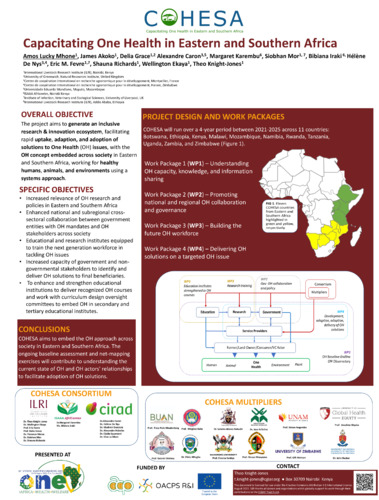Capacitating One Health in Eastern and Southern Africa
Abstract
The world is facing unprecedented, inter-connected threats to the health of people, animals and the environment. Threats to health security originating from animals and ecosystems can best prevented and managed by One Health (OH) which recognizes the interconnection of people, animals, plants, and their shared environment. But attaining the OH dividend requires greater operationalization of OH science and harnessing the power of youth to solve the problems of the present and future. In line with this approach, this project aims to enhance national and sub-regional cross-sectoral collaboration between government entities with OH mandates and OH stakeholders across society, to equip educational and research institutes to train the next generation One Health workforce, and to increase the capacity of government and non-governmental stakeholders to identify and deliver OH solutions to key problems. To conceptualize the above objectives, we conducted an expert integrative review to identify OH capacity potential and gaps in eastern and southern Africa, to develop a four-year, eleven-country project to translate OH science to development impact. We identified neglected zoonoses, emerging zoonoses, food safety and livestock associated antimicrobial resistance as key OH domains, with soil health subsidiary. Multi-criteria processes identified 11 priority countries (Botswana, Ethiopia, Kenya, Malawi, Mozambique, Namibia, Rwanda, Tanzania, Uganda, Zambia, and Zimbabwe, of which four are deep dive) and four support areas (observatory, platforms, future workforce and field solutions). A consortium was developed of research and research translation institutes (three Africa-based) linked to multipliers in priority countries. Future OH capacity will be enhanced through strengthening educational institutions to deliver recognised OH courses. Delivery of solutions for a specific OH issue is planned for Ethiopia, Kenya, Mozambique and Zimbabwe, with the approach then used as a model for OH delivery. This initiative will ensure government entities capacitated in the development of evidence based One Health strategies and policies, education institutes strengthened in building OH capacity of the present and future workforce, and research institutes capacitated in identification, development, adoption and delivery of One Health solutions.

